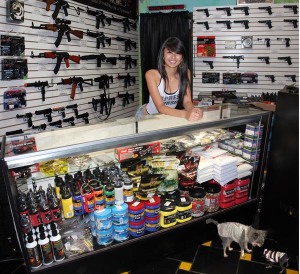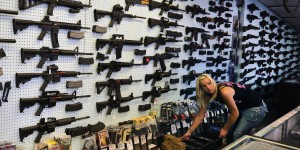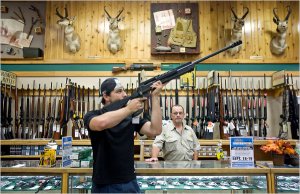Buying a gun represents a one-time purchasing process. You are literally buying a gun for life. The buying of firearms is very different from purchasing the common, GMO crap found at the local supermarket – no matter what the Amerikan hack politicians say. And, the buying of firearms in the United States is not easier than buying regular garden equipment, or any other important supplies for daily living. The purchase of a metal shooting piece is a long drawn-out process. The reason for all of this process is permanence. Once you buy that gun, it should stay with you forever – unless you find yourself in a tight legal situation where you have to relinquish your firearm.
Out west, my first forays into the gun store world revolved around checking for the weapons that the sellers had in stock. I would later revisit the store, browsing for the right weapons that fit my medium to small hands. I always had an idea beforehand about the type of weapon I had originally wanted to purchase, whether a long gun or a pistol.
Unfortunately, I have also experienced gun store bullies that push particular weapons on certain customers – such as women, or just people that don’t have the ‘gun guy’ look, such as myself. There are those few gun stores that throw out spurious information to the customers – often personal opinions mixed with aggressive salesmanship. As we say in the States: buyer beware.
There are also those naive customers that don’t know how to act inside a gun store. They want to rant on politics, or show-off their shoddy knowledge about guns and gun culture – rather than buy anything. There also exist the indiscreet ones who commit some bad faux-pas, like handle weapons and point them in the direction of everyone around them, or they try to take apart the guns to find out if they have any issues from previous users.
A few potential buyers will just say some dumb things to the sellers. They use inflammatory vocabulary or express hatreds, which puts the gun store employee in a bad position. The gun seller has to then deny the sale of a weapon to the client. There are even foolish buyers who forget that they still have unsealed felonies or very recent misdemeanors on their records. Even a recent divorce with one’s wife or a DUI can get a rejected background check for owning a weapon.
Before going into a gun store, the buyer must first understand why they truly need a weapon, and then really think it over. If they know how to safely handle a weapon, then there is particular firearm that will fit their hand and lifestyle
Does the buyer need a long rifle for hunting game, and does he or she know how to skin a buck in the wild? Or does the person own a business in a part of town that often gets dodgy late at night. There is also the question about home protection, and the even more important question concerning the people that reside inside of the house – and especially if there are kids around. Do the kids know the safety protocols and how to handle shooting?
Maybe the individual would like to carry full-time, take a CCW course, and then receive a state permit for concealed carry. Where a person lives also matters. One particular weapon works better in an urban environment over a rural one. The home owner living in the mountains might encounter angry bears or a pack of coyotes that wouldn’t mind making a dinner with the household pets.
The potential gun buyer also has to consider the deeper reasons for owning a firearm. Is it truly for personal protection, or does he or she just want to show off to friends about being a part of the American gun culture, intimidate the local ‘g fellas,’ or ‘gangstas’ down the street, or even play around at home with something really dangerous. All of the latter reasons negate owning a firearm. If the person feels comfortable learning the basic safety protocols with owning a firearm and truly understands the responsibility in owning a weapon, which also has the potential for exterminating life, then he or she is ready to purchase one.
Final considerations for owning a gun also consider the mental states of the owners. Does he or she frequently lapse into deep depressions, or they cannot control their intake of alcohol and other drugs – then the world of firearms is not for them.
Now the hard part comes along. The buyer has to find the right gun store in order to buy the right type of weapon. Living out in the western US, there are a bunch of gun stores to choose from in the region. Getting recommendations and warnings from other gun owners is a good first method. Finding the right store and avoiding the bad ones is also important – and the bad gun stores do unfortunately exist.
How do you know if you are in a bad one? If you enter a gun store and immediately the gun seller, employee, or another customer chatting with the seller, start pressuring a type of weapon on you, then you have entered a scam operation. Stop the conversation by thanking the people for their information, and walk out – never to return.
When you enter the gun shop for the first time, act the gentleman, with a good morning or good afternoon, and state what type of weapon you are looking for and the reasons. A decent gun seller will know what type of weapon would fit you, while he or she is aware about what the actual gun store has in stock.
A well-versed gun seller will show you some guns on display and will then ask you about your shooting experience, where and how you will store the gun, and will check your hand size. The seller will also factor in the size of the ammo rounds, gun locks, or in the case of pistols, the size of the holster.
The buyer should ask permission from the seller to hold the weapon. When the buyer handles the weapon, the barrel must face either up to the ceiling or down to the ground. Remember, all guns are potentially loaded – even when on display.
The buyer needs to feel if the stock of the gun fits his or her hand well and if the weapon feels comfortable for firing. If the stock is too big, or the weapon feels too heavy, then firing the weapon will create greater hardships. The gun needs to feel comfortable and secure around one’s arms and hands.
The next questions towards the seller ought to concern the ammunition for the firearm. Is the ammunition hard to find, expensive, or does it give a heavy kickback, which makes shooting the weapon a dangerous exercise? A good gun seller will explain all the variables with each weapon on display.
The buyer has to ask the seller on how to disassemble, clean the weapon, and the safety protocols for handling such a weapon. All firearms have some type of safety mechanism near the trigger guard. A good gun seller will clearly show the general disassembly, cleaning operation and safety protocols.
Other important variables regard the weapon itself, is it new, or is it a second-hand one purchased from a private party. The buyer should inspect the barrel, action and bore for any noticeable discrepancies and check for any excessive dirtiness.
Are there any particular legal consequences within a certain state for possessing such a weapon? Is the rifle cumbersome to carry around, or does the gun safety seem too weak with a possible chance of a negligent discharge? Would a semi-automatic version of a similar model work better, or is a revolver, or even a pump-action better? Buying the right gun for the right person takes time.
Sometimes it is good to visit various gun shops and then come to a conclusion at home on how to purchase the best weapon. The decision includes pricing, quality, reviews on-line, personal fit, ease of disassembly, cleaning, and safety mechanisms.
During the handling of the firearm with the multiple questions that arise concerning the firearm, the buyer should focus solely on the weapon and its fit. Using tyrannical anti-gun vocabulary, such as ‘assault weapon,’ ‘cop killer rounds,’ or ‘mass shooting clip,’ will put the seller on the defensive, and it might make him or her stop talking to you completely and end the sale.
With each passing year, the US Federal Government, under its ATF gang, harasses more and more gun shops. Recently, under its Operation Choke Point, the US Federal Government has forced banks to stop doing business with gun shops.
All gun stores have to retain a federal license to sell weapons, called a FFL. When you use the corporate media’s gun control words inside the store, the gun store owner might think that you are either a rogue government agent, a provocateur from an anti-gun group, or more than likely, a mentally unstable individual. If a seller feels that the potential buyer would possibly act violent with the weapon, then the seller by law cannot sell the firearm to that person.
Once the buyer decides to purchase a firearm, then he or she must show their state ID, usually a driver’s license, and afterwards, fill out the firearm application form. The form asks for the general personal information of the buyer, including date of birth, race, marriage status, ID number, physical address and social security number. By law, all gun buyers must buy from a store within their own states. A person living in Wyoming cannot buy weapons in Montana.
The form also asks about any past mental imprisonment, drug-alcohol issues, criminal history, or any issues regarding divorce-visitation-child custody. If you answer yes to any of those questions, then the state background check will probably reject your application. If you have any past felonies, then ask your attorney to seal the cases, so the felonies do not show up on your check. Do this before you fill out the application. If you are nervous about filling out the application due to some past issues, or for any reason, then talk to your attorney before venturing into a gun store and filling out the application.
Once you pass your state background check and fully pay for your gun, you are now an official gun owner. Buy the right ammunition for the weapon, and any necessary accessories, such as snap caps or dummy rounds in order to practice at home.
You must also have a case to carry the gun inside, a gun lock, cleaning materials, or if necessary, a sling for a rifle, or a holster for a pistol. When you arrive home with your weapon, open the case, find the user’s guide and manual, read all of it, and put the gun away. You own a singular tool that with regular safety, practice and cleaning, will both accompany you and protect you for the rest of your life.





